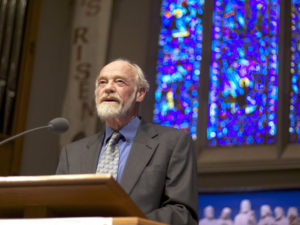Some of you may recognize the name Eugene Peterson as the man who produced the popular paraphrase of the Bible known as “The Message” (in terms of full disclosure, I have never been particularly impressed by that – or any other – paraphrase of Scripture). What you may not know about Peterson is that he has also been a prolific author and influencer of those in ministry. He served as both a pastor (in the PCUSA denomination) and a theology professor at Regent University in Vancouver, British Columbia. Though retired for the past several years, Peterson has remained influential. So, it should come as no surprise that there were many who were interested in what his position was regarding same-sex relationships.

You’ve heard from many in the evangelical world, myself included, that each and every believer will face this question, whether sooner or later (and the way things are going, it looks like sooner for most of us). The new social orthodoxy regarding LGBTQ+ issues requires allegiance to that cause without any deviation. Indeed, to deviate from not only full acceptance, but full celebration, of those values results in being ridiculed and ostracized. It may even cause you to lose your business or employment, and the time may be coming when it might even cost you your freedom under the guise of “hate crimes” legislation. It is critically important that every believer thinks through what his or her response will be when the question comes. Will it be a firm affirmation of the truth of God’s Word, an outright denial that God’s Word means what it says, or some kind of mealy-mouthed equivocation?
For Peterson, that question came recently in the guise of an interview by Jonathan Merritt, a religion reporter whose pieces have appeared in The Atlantic, The Washington Post, and Religion News Service. Merritt is the son of SBC past president James Merritt and is himself a gay man (though, by all accounts, a chaste one). In Merritt’s interview, Peterson revealed that his attitude toward the subject of homosexuality had evolved over the past several years to the point where, if he were asked, he would officiate a same-sex “marriage.” After significant backlash, Peterson retracted that statement, but appears to have stood by the other affirming statements he made in the interview (including one in which he said that same-sex relationships were “not a right or wrong as far as I’m concerned”). As is often the case when a person veers away from what the Bible says, this was not a recent change of mind and heart; these statements represent a trajectory that began long ago (which is ironic, given that one of Peterson’s best known works is entitled A Long Obedience in the Same Direction).
What are we to make of such statements? First, while I believe that we should grieve over Peterson’s drifting from the truth of God’s Word, we should do so with a careful evaluation of our own hearts. The author of Hebrews says in 2:1, “Therefore we must pay much closer attention to what we have heard, lest we drift away from it.” Recognize that each of us can drift away from the truth of “what we have heard,” led astray by our own sinful desires. Second, we must be all the more aware that we will hear repeatedly from the world, and those who wish to be accepted by it, all sorts of rationales for why sin should be accepted. Some of these defenses will come from people we might otherwise have considered solid, and frankly, that can wound us deeply. In those moments, remember that even the most gifted teachers remain human, susceptible to being blind in certain areas and falling away from the truth. Give grace, but stand firm for the Truth. Third, be cautious about personalizing sin. In his interview (and other remarks he’s made over the past few years), Peterson intimated that his view on homosexuality changed not because he misunderstood and misinterpreted God’s Word, but rather because he had people in his congregation who were openly practicing the lifestyle (including a music minister hired by the church he pastored). He allowed his affections for people (a good thing) to lead him to accept sin (a bad thing). We are all inclined to first humanizing sin and then to excusing it. The time to answer this particular question is coming faster than you think; are you prepared? Just something to think about…

0 Comments